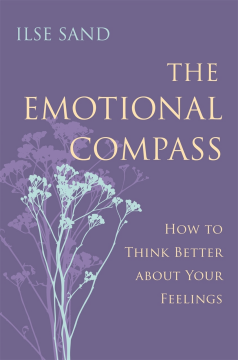
Additional Information
Book Details
Abstract
Feelings are something we have, not something we are.'
Revealing the complexity of emotions such as happiness, anger, fear, and jealousy, and how these are based on our perception of other people, Ilse Sand offers her professional wisdom on the psychology of feelings. Establishing that emotions are not always as appropriate as they first appear to be, the book encourages you to take a closer look at why you are feeling certain things, and how you can change how you feel. Especially written for highly sensitive people, guidance is included on how to identify the vulnerable feelings that often underlie our more volatile emotional states, and practical activities are suggested to help to embrace or reject sadness, delay impulsive actions, and allow yourself to be happy. Drawing on real-life examples throughout, the book offers you the means to improve your understanding of not only your own emotions and emotional actions, but those of others. The book will be immensely useful not only to people who feel things strongly, but to those who have trouble understanding or interpreting emotions and how to respond to the feelings they provoke.
This is the style of self-help that I love: dense content with no fluff. The Emotional Compass contains logical, actionable guidance for identifying our feelings (something many of us might not realize we need help doing) and managing anxiety, jealousy, anger, and envy as a sensitive person
Kelly O’Laughlin, The Highly Sensitive Person Podcast
Ilse Sand guides you with simple advice and concrete exercises through the labyrinth of emotions, so you can learn to let go of old, unwelcome patterns and start working through your emotions - and, more to the point, achieve a greater acceptance and understanding of your feelings and the feelings of others.
Magasinet Psykologi [Psychology Magazine]
The book is written as simple, straightforward advice in which complicated material is made easy to understand. The language is reader-friendly and accommodates our differences with great understanding.
Tidsskrift for Psykoterapi [Journal of Psychotherapy]
Ilse Sand is a theology graduate from the University of Aarhus, where she wrote her Master's thesis on C.G. Jung and Søren Kierkegaard. She is also trained in several psychotherapeutic approaches and is registered with the Association for Psychotherapy in Denmark. After being employed for several years as a parish priest for the Danish National Church she now works as a supervisor, trainer, speaker and therapist. See more at www.highlysensitive-hsp.com
In exemplarily clear and easy-to-read language, without therapeutic clichés, Ilse Sand takes readers through a cleansing bath for emotional mental hygiene.
The book is highly recommended.
Bent Falk, psychotherapist MPF, M.Th.
Table of Contents
| Section Title | Page | Action | Price |
|---|---|---|---|
| The Emotional Compass - How to Think Better about Your Feelings by Ilse Sand | 3 | ||
| Preface | 7 | ||
| Introduction | 9 | ||
| 1. Finding Your Primary Feeling in the Present | 10 | ||
| 2. Distance Yourself from Your Thoughts | 20 | ||
| 3. Avoid Unnecessary Conflict | 25 | ||
| 4. Listen to the More Soft and Vulnerable Feelings that Lie Beneath Anger | 32 | ||
| 5. Say What You Wish for and Want | 56 | ||
| 6. Resist Being ‘Sad’ or Embrace It Entirely | 60 | ||
| 7. Use Your Envy Constructively | 77 | ||
| 8. Listen to Your Feelings of Jealousy | 86 | ||
| 9. Know Your Anxiety | 90 | ||
| 10. Holding Back When Feelings Grow Strong | 94 | ||
| 11. Let Joy and Happiness Unfold | 97 | ||
| 12. Invest in Your Relationships | 103 | ||
| 13. Save the Explanations - Expand Your Self-image | 109 | ||
| Story - The Hope | 118 | ||
| Appendix 1 - Write a \nFarewell Letter | 123 | ||
| Appendix 2 - Tables for \nHappiness Analysis | 129 | ||
| Thanks to… | 131 | ||
| Bibliography | 132 | ||
| Index | 133 |
